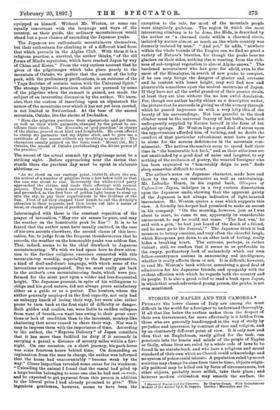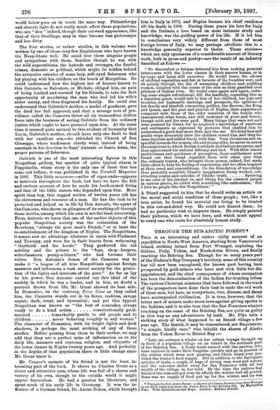STORIES OF NAPLES AND THE CAMORRA.*
PERHAPS the lower classes of Italy are among the most difficult in the world for a foreigner to understand thoroughly. If all that lies below the surface makes them the despair of their own Government, far more effectually is it hidden from those who are generally handicapped in the way of study by prejudice and ignorance, by contrast of race and religion, and by an obstinately different point of view. It is only now and then that an Englishman, rarely gifted for the task, can penetrate into the hearts and minds of the people of Naples or Sicily, whose lives are ruled by a whole code of laws to be found in no statute-book, and who have a religions and moral standard of their own which no Church could acknowledge and no system of police could tolerate. A population ruled by secret societies may change its aims from time to time; objects origin- ally political may be killed out by force of circumstances, but other objects, probably more selfish, take their place; and however modern civilisation may smooth the surface, the • Stories of Naples and the Canterra. By Charles Grant. With Introductory Memoir of the Author by J. B. Capper. London : Macmillan and Clo.
world below goes on in much the same way. Philanthropy and electric light do not really much affect these populations, who are " dim " indeed, though their outward appearance, like that of their dwellings, may in time become less picturesque and less dirty.
The four stories, or rather studies, in this volume were written by one of those very few Englishmen who have known the Neapolitans well. He could love these singular people and sympathise with them, familiar though he was with the wild superstitions, the hatreds and revenges, the fearful crimes, domestic or political, which might lie hidden behind the attractive exterior of some lazy, soft-eyed fisherman who lay playing with his children on the beach of Mergellina. He could understand how the highest law of honour known to this Gabriele, or Salvatore, or Michele, obliged him, on pain of being loathed and scorned by his friends, to take the first opportunity of murdering the man who had led his wife's sister astray, and thus disgraced his family. He could also understand that Gabriele's mother, a model of goodness, gave the deed her full approval, and that a strange sort of pro- -vidence called the Camorra threw all its tremendous bidden force into the business of saving Gabriele from the ordinary justice which ought to have pounced upon him. At the same time it seemed quite natural to this student of humanity that Lucia, Gabriele's mother, should have only one fault to find -with her excellent son,—he attended the Church of San
-Giuseppe, where tradesmen chiefly went, instead of being constant in his devotion to Sant' Antonio or Santa Anna, the
• proper patrons of fishermen.
Gabriele is one of the most interesting figures in this Neapolitan gallery, but another of quite typical charm is Peppiniello, whose story is the only one of these that has come out before; it was published in the Cornhill Magazine in 1882. This little mozzonare—seller of cigar-ends—appears at intervals throughout the book, but here we have the full -and curious account of how he made his hard-earned living and that of the little sisters who depended upon him. More spirit than boy, this ragged urchin of twelve years old has the cleverness and resource of a man. He has the luck to be protected and helped on in life by Don Antonio, the agent of the Camorra, who shows us glimpses of its working all through these stories, among which his own is not the least interesting. From Antonio we learn that one of the earlier objects of this popular Neapolitan society was the restoration of the Bourbons, "always the poor man's friends," or at least the Te-establishment of the kingdom of Naples. The Neapolitans, it seems, saw no advantage whatever in union with Piedmont and Tuscany, and were far in their hearts from welcoming "Garibaldi and his horde." They preferred the old nobility and the priests to the "fops, shop - keepers, schoolmasters, penny-a-liners," who had become their rulers. Don Antonio's dream of the Camorra was to make it "a league of all true Neapolitans against foreign manners and influences, a vast secret society for the protec- tion of the rights and interests of the poor." As far as lay in his power, Don Antonio carried out this ideal of the -society in which he was a leader, and in him, no doubt a portrait drawn from life, Mr. Grant showed its beat side. In Domenico, on the contrary, Pesce Cane as they called him, the Camorra stands out in its fierce, reckless, savage aspect, dark, cruel, and tyrannical ; and yet this typical Neapolitan was known as "the best of comrades, always
ready to do a kind action constitutionally good- natured remarkably gentle to old people and to children never behaving roughly to any woman."
The character of Domenico, with its bright lights and dark shadows, is perhaps the most striking of any of these -studies. Before passing from them to their author, we may add that they are a perfect mine of information as to the daily life, manners and customs, religion, and etiquette of the lower classes in Naples twenty years ago. And probably in the depths of that population there is little change since Mr. Grant knew it.
Mr. Capper's memoir of his friend is not the least in- teresting part of the book. It shows us Charles Grant as a -clever and attractive man, whose life was full of a charm and variety of its own, though to the outside world it might appear featureless. He had a passion for literature, and spent much of his early life in Germany. It was the in- fluence of a German friend, Dr. Anton Dohrn, which brought
him to Italy in 1872, and Naples became his chief residence till his death in 1889. During these years his love for Italy and the Italians, a love based on most intimate study and knowledge, was the guiding power of his life. If it led him to conclusions very widely different from those of most foreign lovers of Italy, we may perhaps attribute this to a knowledge generally superior to theirs. These stories— which are only specimens of a considerable amount of literary work, both in prose and poetry—are the result of an industry described as follows:—
" No discomfort or fatigue deterred him from seeking personal intercourse with the lower classes in their narrow homes, or in by-ways and lanes still narrower. He would brave the odours of oil-fried vegetables and fish in taverns of the humbler sort, and sit quietly through the din of screaming children and scolding women, mingled with the curses of the men as they gambled over pitchers of Italian wine. He would come again and again, order- ing some simple refreshment, till the landlady, regarding him as a harmless guest, would talk to him of her children, her joys and troubles, her husband's earnings and prospects, the opinions of her family and kinsfolk concerning politics, the Governo, the King and Queen, and the past and present of Naples, their experiences compared with those of the older members of the family, who remembered other times, and still reckoned in grani and tornesi, though soldi and lire were paid. Many things that were not said were guessed by Grant, for he acquired a knowledge of emotions and sentiments as expressed by gestures that enabled him to understand a good deal more than met the ear. His kind face and gentle ways invariably drew the children round him, and they be-. came familiar and talked freely with him. Very chivalrous and re- spectful towards the women, old and young alike, he never incurred the suspicions to which Italian husbands and fathers are prone, and they appreciated his natural delicacy and tact. With their innate sensitiveness and quickness of perception, these southerners soon found out that Grant regarded them with other eyes than the ordinary tourist, who brought them money, indeed, but made little effort to hide his feeling of superiority, and too often laughed at their creed and superstitions. On the foundation of knowledge thus patiently acquired, Grant's imagination freely worked, con-
structing scenes and episodes of lifelike truth Speaking to me once of his interest in, and liking for, the common people in various places, he added with something like enthusiasm, But I love no people like the Neapolitans.'"
A friend suggested to him that he should write an article on the moral and social condition of these people ; but, like a true artist, he found his material too living to be treated in this cut-and-dried way. He could not dissect them ; he had no particular wish to improve them. He simply painted their pictures, which we have here, and which must appeal to every one who cares for absolutely honest study.



































 Previous page
Previous page